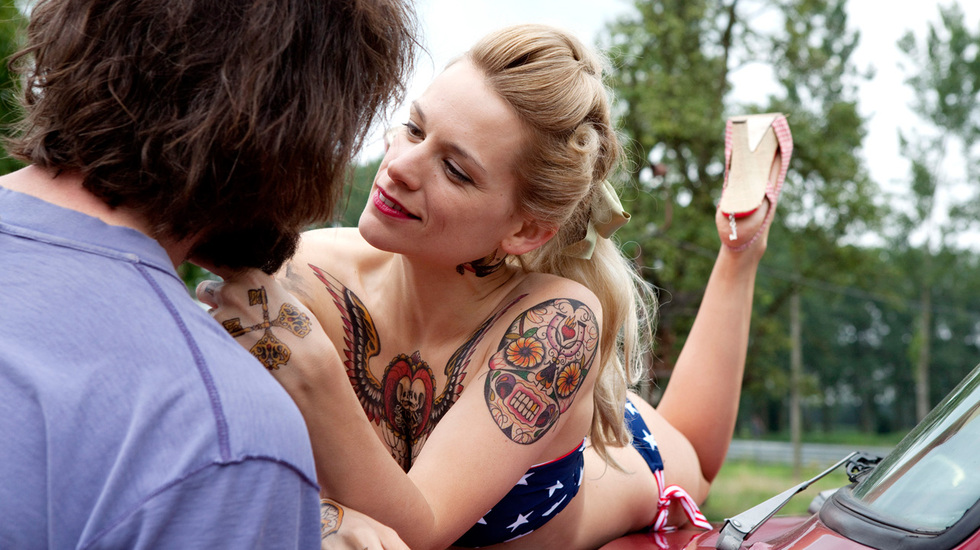
An immaculately observed, desperately moving story of love, loss, and bluegrass music, it’s easy to see why Belgian film “The Broken Circle Breakdown” has been picking up awards: Best Actress and Best Screenplay from Tribeca and the Audience Award and the Europa Cinemas Award from Berlin. While Felix von Groeningen‘s film, which centers around a couple whose child is diagnosed with cancer, could easily have strayed into maudlin territory, the deft, non-chronological structure and the constantly surprising, beautiful performances—both acting and the musical—elevate it well clear of any Movie of the Week associations.
Elise (Veerle Baetens) is a tattoo artist (boasting quite a bit of ink herself), into whose store one day strolls Didier (Johan Heldenbergh, also the co-writer of the play on which the film is based), a sort of Flemish cowboy who plays in a bluegrass band and has an unabashed love of Americana and a vehemently atheist philosophy. They fall in love, marry and Elise joins the band (which is populated by a kindly group of variously bearded men, one of whom is Jan Bijvoet, from our Cannes pick “Borgman”), before discovering she is pregnant. After a brief rocky period, Didier comes to terms with imminent fatherhood, frantically doing up the farmhouse he owns to make it fit for a new family, and Maybelle is born. Their halcyon existence is splintered, though, and then slowly exploded, following the discovery that Maybelle (Nell Cattrysse) has cancer, and interminable rounds of chemo begin.

Again we understand how, told in bare chronological outline, it might seem like the film is that overfamiliar form of tragedy porn which layers on the pathos in its inevitable downward trajectory toward miserabilism. But the brilliance of Van Groeningen’s approach is in the assured and fluid way he cuts around in time, not so much back-and-forth as elliptically loop-the-looping, telling the stories of, roughly, three different time periods. He proves himself a master of counterpoint, editing the sad scenes of the parents’ hospital visits right up against scenes that show the first flush of giddy love between the two: the result is to make the highs higher and the lows lower by contrast and it is devastatingly effective. It put us much in mind of Derek Cianfrance‘s “Blue Valentine” in that changing the manner in which the story is told in time also changes the tone of the film overall, making sometimes surprising connections that provoke more complex and nuanced thoughts and emotions then a more linear telling ever could.
Very occasionally, though, the juxtaposed chronology becomes muddled, especially toward the last third of the film when the third time period “strand” is introduced. In fact this portion of the film does prove the most problematic, with the film’s characters once or twice resorting to speechifying to lay out a little too clearly the subthemes. It’s a pity because the subtler way those undercurrents had been handled to that point (largely to do with Didier becoming ever more ferociously anti-religious while Elise starts to find comfort in a kind of undefined spirituality) had proved one of the film’s great strengths: where a lesser movie might concentrate solely on the character’s emotions, this one wants to deal with tragedy’s effect on their ideals too. The impulse, however, is noble even if the execution has uncharacteristically clumsy moments later on: Van Groeningen shifts the nexus of the film’s tragedy away from Maybelle (hard to do as a sick child will always exert a gravitational pull on our emotions), and onto Elise and Didier as they lose first each other, and then perhaps themselves. It’s a mark of how much these two fine actors have made us care for their characters that we feel those losses as deeply as we do anything else.

And of course, there’s the music. The soundtrack has apparently been a bestseller in Belgium where the film has already had a very successful run, and it’s not hard to see why. The original bluegrass songs, composed by Bjorn Eriksson, are by turns haunting and jaunty, and again, Van Groeningen uses them to sometimes complementary and sometimes contrasting effect. But whether it’s a ballad of loss and sadness or a more honky-tonk tongue-in-cheek barnstomper, the two actors, whose singing voices are terrifically well suited to the material, find a harmony that adds further layers to our understanding of their relationship. Really, we fall in love with them a bit.
We’re not too proud to admit we cried, more than once and less than tidily, and at sometimes odd junctures: the world’s most poignant rendering of “The Lion Sleeps Tonight,” the striking up of an almost shockingly upbeat tune around a certain hospital bed; and simply the saddest, most grief-ridden but loving sex scene we’ve seen in a long time. There’s no escaping that the film will jerk tears, but it doesn’t deserve the pejorative label that might suggest—there may be some stumbles but in broad strokes, Van Groeningen seems to innately understand that sorrow truthfully communicated and shared can be cathartic, rather than depressing. The song may be sad, but when we’re invited to join together in raising it, it can lift our hearts even as they are gently broken. [B+]
This is a reprint of our review from the 2013 Karlovy Vary Film Festival.






This is a horribly overrated drag of a film.